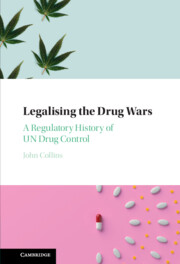Book contents
- Legalising the Drug Wars
- Legalising the Drug Wars
- Copyright page
- Dedication
- Contents
- Acknowledgements
- Abbreviations
- Historical Overview: The International Drug Control System
- Introduction
- 1 Drug Diplomacy from the Opium Wars through the League of Nations, 1839–1939
- 2 International Drug Control in Wartime, 1939–1945
- 3 Creating the UN Commission on Narcotic Drugs, 1945–1946
- 4 Reconstructing Drug Control in Europe, Asia and the Middle East
- 5 Old Battles Anew at the UN Commission on Narcotic Drugs, 1946–1948
- 6 Dividing Up the Global Licit Market, 1948–1953
- 7 From the 1953 Protocol to the 1961 Single Convention
- 8 Assessing the Legal Legacy of the Single Convention
- 9 Conclusion: UN Drug Control in the Twenty-First Century
- Notes
- Bibliography
- Index
4 - Reconstructing Drug Control in Europe, Asia and the Middle East
Published online by Cambridge University Press: 25 November 2021
- Legalising the Drug Wars
- Legalising the Drug Wars
- Copyright page
- Dedication
- Contents
- Acknowledgements
- Abbreviations
- Historical Overview: The International Drug Control System
- Introduction
- 1 Drug Diplomacy from the Opium Wars through the League of Nations, 1839–1939
- 2 International Drug Control in Wartime, 1939–1945
- 3 Creating the UN Commission on Narcotic Drugs, 1945–1946
- 4 Reconstructing Drug Control in Europe, Asia and the Middle East
- 5 Old Battles Anew at the UN Commission on Narcotic Drugs, 1946–1948
- 6 Dividing Up the Global Licit Market, 1948–1953
- 7 From the 1953 Protocol to the 1961 Single Convention
- 8 Assessing the Legal Legacy of the Single Convention
- 9 Conclusion: UN Drug Control in the Twenty-First Century
- Notes
- Bibliography
- Index
Summary
This chapter examines regional efforts to secure drug markets and re-regulate industries. As peace arrived, and the creation of a UN drug control system looked certain, questions of national and regional controls loomed large. First was the question of re-establishing regulatory frameworks in post-war Europe. Germany was key given its historical centrality to licit manufacturing as well as its geopolitical lynchpin status. However, it was unclear whether the Allies could bridge widening geopolitical fault lines to re-establish drug control. In the case of Japan the US had a potential prohibitionist and regulatory beacon for the rest of Asia. With the strong support of the General Douglas MacArthur Administration US goals would be far easier to achieve. Next was the re-resettling of political frontiers of international drug policy reform. Momentum towards a production limitation convention had stalled prior to the war. The future role of China, the world’s largest opium producer, was rendered insoluble by its internal collapse. The US initially focused on creating a tripartite Turkish-Yugoslav-Iranian producer agreement. Further, the question of ‘quasi-medical’ opium use in British and other European colonies remained a transatlantic dividing line. If Britain could continue a non-smoking form of opiate consumption in Malaya, Hong Kong, Borneo and Burma it would provide an alternative to the US model of outright prohibition.
Keywords
- Type
- Chapter
- Information
- Legalising the Drug WarsA Regulatory History of UN Drug Control, pp. 90 - 112Publisher: Cambridge University PressPrint publication year: 2021



